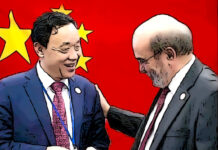On 6/13/21, the citizens of the Canton of Ticino-thanks to the initiative of the Swiss Communist Party, supported by the Greens and various other political forces-confirmed their willingness to include the principle of food sovereignty among the social goals set forth in the Constitution.
‘Food sovereignty allows for the just recognition of the dignity of the workers of the earth.’
Ticino thus becomes the first canton-and indeed the first democracy, in the Old Continent-to express precise concern for the human rights on which life depends. On the trail blazed by the international peasant movement La Via Campesina at the FAO Word Food Summit in Rome in 1996.
Food sovereignty, the alliance in Ticino.
Maximilian Ay – grand councillor (deputy) of the Swiss Communist Party – proposed the constitutional reform under consideration, to the Grand Council (Parliament) of Ticino, on 19.2.18. (1) The initiative garnered broad political support, resulting in the formation of a cross-party committee for food sovereignty, of which they were members:
– the Greens (environmentalists)
– the People’s Democratic Party (the Christian Democrats)
– the League of Ticinese (nationalist-regionalists)
– The Socialist Party (Social Democrats). (2)
The Grand Council approved the reform scheme by a large majority (52 votes for, 18 against and 5 abstentions) on 19.10.20. With additional contributions from members of Movement for Socialism (Trotskyist), More Women (feminist civic list), a minority of the Democratic Union of the Center UDC (populist right-wing). On the opposite side are the Radical Liberal Party and the liberalist stream of the UDC. The popular vote finally confirmed the reform, on 6/13/21, with 62.2 percent Yes.
Canton of Ticino, the reform of the Constitution
‘The Canton shall ensure that (…) respect for food sovereignty is guaranteed, as to
– Accessibility to foods for a varied diet,
– sustainable land use and
– citizens’ right to be able to decide on their own food and production system’ (Constitution, Article 14. Social Objectives of the Canton).
Objectives of the reform
The reform of the Constitution aims at the concrete implementation in Canton Ticino of the principles and rights affirmed in the International Declaration of Nyéléni (2007. See footnote 3). Namely:
1) Food.
– Ensure that all people have access to healthy, balanced and nutritious food (SDGs 2,3,6, in UN Agenda 2030),
– Support diverse(biodiversity) and sustainable indigenous agrifood production (SDG 12),
– Increase the level of food self-sufficiency (
food security
),
2) Agribusiness chain and labor.
– Ensure transparent and fair price formation, in agribusiness supply chains, (4,5)
– Encourage organizations among farmers to establish trusting relationships and support direct sales to consumers(short supply chain),
– To oversee fair working conditions in food production,
– Promote employment in agriculture, under the above conditions (SDGs 8,10),
3) Environment
– Halt the loss of cultivated land (including summer farming areas, i.e., stable meadows and mountain pastures),
– Combat overbuilding and abandonment (reforestation) of land (SDGs 13,14,15)
Food sovereignty, that’s why
‘Although our canton’s constitution already provides for the right to life (Art. 6), international instability and the resulting market volatility are forcing us to think ever more deeply about our food security. It therefore becomes important to inscribe the principle of food sovereignty among the social objectives of our Constitution’ (Maximilian Ay, 19.10.20. See note 2).
The inter-party committee and the citizens of the Canton of Ticino have thus adapted their own Constitutional Charter, with special provisions on the protection of rights related to land and its commodities, in a historical period that has brought out its absolute necessity. In fact, the concepts of food sovereignty and agroecology-although recognized in the FAO and the UN in recent years (6,7,8)-are still awaiting concrete implementation in almost all of the signatory states.
Food sovereignty, 28 years of commitment of La Via Campesina
La Via Campesina is a movement founded in Mons, Belgium, in April 1993 by farmers and peasants arriving from the African, American, Asian and European continents. To claim basic human rights related to food and its means of production (soil, seeds and water, primarily) by local communities. (9)
On 4/15/94, nonetheless, 123 countries signed the largest agreement on international trade-theWorld Trade Organization (WTO)-which applies indiscriminately to the generality of goods, including agri-foodstuffs. As well as services, intellectual property rights, standards, investment and other issues of importance to economic exchanges. (10)
182 organizations in 81 countries, about 200 million people now join the international peasant movement. To express and reaffirm, with one voice, three main goals:
– Defending food sovereignty and agrarian reform,
– Promote agroecology and defend local seeds,
– Promote the rights of community farmers.
Food sovereignty, local and global challenges
‘The principle of food sovereignty would strengthen the Constitution of Canton Ticino in the protection of its territory and population, as well as have international significance by pointing the way to a just distribution of food and against world hunger’ (Massimiliano Ay, 19.10.20. See footnote 2).
Some of these goals are also mentioned in the Farm to Fork strategy, adopted by the European Commission on 20.5.20, and in the European Parliament’s resolution 20.10.20 against deforestation. (11) However, the smoke gray reform of the Common Agricultural Policy (CAP) remains far from its goals (12), and the socio-environmental sustainability of procurement from non-EU countries still lacks guarantees. (13)
Dario Dongo
Notes
(1) Parliament (Grand Council). Parliamentary initiative elaborated IE497. Amendment of Art. 14 of the Canton Constitution ‘The Food Sovereignty of the Canton of Ticino’. https://bit.ly/3iI5n6U
(2) Grand Council Canton of Ticino, minutes of the session 19.10.20. See item 4, pages 2386-2402 at https://m3.ti.ch/POTERI/legislativo/attivita/vgc/2020/1512-Seduta19s.pdf
(3) Declaration of Nyéléni (village of Nyéléni, Sélingué, Mali), 4.3.07. https://nyeleni.org/spip.php?article328
(4) See Dario Dongo. Unfair trade practices, the lesson of Paris to Coldiretti and Confindustria. GIFT(Great Italian Food Trade). 9.5.21, https://www.greatitalianfoodtrade.it/idee/pratiche-commerciali-sleali-la-lezione-di-parigi-a-coldiretti-e-confindustria
(5) See Dario Dongo. SDGs, the dutiful transformations for the food supply chain. GIFT (Great Italian Food Trade). 9/19/19, https://www.greatitalianfoodtrade.it/progresso/sdgs-le-trasformazioni-doverose-per-la-filiera-alimentare
(6) Dario Dongo. FAO, China in the lead. GIFT(Great Italian Food Trade). 6/27/19, https://www.greatitalianfoodtrade.it/progresso/fao-la-cina-al-comando
(7) Dario Dongo. Agroecology, SDGs, salvation. FAO’s decalogue. GIFT (Great Italian Food Trade). 12.4.20, https://www.greatitalianfoodtrade.it/progresso/agroecologia-sdgs-salvezza-il-decalogo-della-fao
(8) Dario Dongo. Peasants’ rights, UN Declaration. GIFT (Great Italian Food Trade). 11/23/18, https://www.greatitalianfoodtrade.it/progresso/diritti-dei-contadini-dichiarazione-onu
(9) Annette Aurélie Desmarais, Paul Nicholson (2013). La Via Campesina: An Historical and Political Analysis . https://viacampesina.org/en/wp-content/uploads/sites/2/2013/05/EN-10.pdf.
(10) The agreement establishing the WTO (or WTO, World Trade Organization) replaced and expanded the previous GATT(General Agreement on Tariffs and Trade, 1948) agreement, effective 1.1.95. Currently 168 countries from five continents participate, accounting for about 96 percent of international trade and GDP (or GDP, Gross Domestic Product) globally. The full list of member countries, and intergovernmental organizations participating as observers, at https://www.wto.org/english/thewto_e/whatis_e/tif_e/org6_e.htm
(11) Dario Dongo. Unsustainable deforestation and commodity imports. Public consultation on EU strategy. GIFT (Great Italian Food Trade). 4.4.21, https://www.greatitalianfoodtrade.it/progresso/deforestazioni-e-import-di-commodities-insostenibili-consultazione-pubblica-sulla-strategia-ue
(12) Dario Dongo. Post-2020 CAP, smoke gray. An organic revolution is needed. GIFT (Great Italian Food Trade). 10/22/20, https://www.greatitalianfoodtrade.it/consum-attori/pac-post-2020-grigio-fumo-serve-una-rivoluzione-bio
(13) Social justice, on the other hand, is completely outside the scope of European policies, beyond the timid proposal for an EU directive on a guaranteed minimum wage. V. https://www.egalite.org/salario-minimo-garantito-proposta-di-direttiva-ue-per-la-sostenibilita-sociale-del-lavoro/
Dario Dongo, lawyer and journalist, PhD in international food law, founder of WIISE (FARE - GIFT - Food Times) and Égalité.








